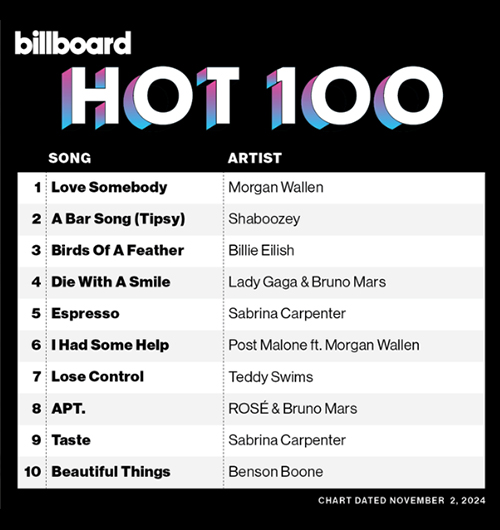K-Content News
- January 14, 2025 | Music
Could “APT.” Be the Signal for “Post K-pop”?
While K-pop has garnered passionate fandoms in Western regions, it has often been regarded as a niche genre rather than a staple of mainstream culture. However, ROSÉ and Bruno Mars's collaborative single "APT." recently created a small crack in that stereotype. Starting with "APT.," will K-pop gradually be recognized simply as “pop”?

ROSÉ and Bruno Mars's "APT." ©THE BLACK LABEL Instagram
As 2024 neared its end, one powerful single made a surprise appearance. On October 18, BLACKPINK member ROSÉ, ahead of her first full album "rosie," released the new song "APT." in collaboration with pop star Bruno Mars. Their meeting garnered much attention upon release and continued a steep upward trend. It topped all five domestic music charts including Melon and Bugs, while overseas it reached No. 8 on the U.S. Billboard chart and No. 2 on the UK Official Chart. It set records reaching No. 1 in 13 countries on Apple Music charts. Not to mention surpassing 300 million Spotify streams and achieving TikTok's fastest 2 billion views. All these achievements came within less than a month of release.

ROSÉ's "APT." reached No. 8 on the Billboard charts within two weeks of release
Source | Billboard website
A Complex Hit Combining Multiple Elements
As APT. rose to become a defining global hit of 2024, its success sparked a flurry of analyses. Some attributed it to the seamless synergy between two singers with different styles, while others answered it was the victory of chant format composed for easy singing along like cheering slogans. Some viewed K-pop faction's influence grew over several years, naturally creating interest in 'K-subculture.' Arguments also emerged from linguistic perspectives about 'Konglish' pronunciation in the chorus creating exotic word flavor, and claims about forming familiarity by recalling pop-punk genre that dominated charts during the pandemic period.
Yet APT. is more than just the sum of its parts—it is a track that anyone, regardless of age or background, can enjoy, while simultaneously offering layers of cultural and musical intrigue. Examples include drawing ideas from drinking games popular among Korean youth, and creating short, upbeat chant-pop through slight modifications based on Tony Basil's legendary 1982 cheer song "Mickey." Maintaining the Korean Konglish pronunciation " APATUE" instead of the English "apartment" also received favorable responses. A brief look at social media easily finds videos of foreigners singing along to "APT." with awkward pronunciation, and even learning and demonstrating the "APT. game."

A scene from "APT." music video
"APT." Crossing Boundaries Between Pop and K-pop
A closer look at APT. reveals an approach that diverges significantly from the traditional K-pop playbook. First, it neither follows entertainment companies' rigorous production systems, nor attempts to preempt trending genres and sounds by quickly following trends. It doesn't showcase group dance performances with dancers or produce high-sensitivity videos with massive capital investment. Instead, APT. opts for simplicity and charm: playful alternations of dancing, singing, and casual instrumental performances on monochrome sets filtered with a vintage aesthetic.
Unlike the fandom-based demand formula achieving quick chart entry through concentrated firepower of album and download numbers in short periods, consistent high streaming numbers evenly distributed across various countries' rankings is a notable difference. This means the success metric is based on the "general public." Though predominantly sung in English, the song retains subtle "K" elements. ROSÉ's playful Korean line referencing"Chaeyoung's favorite random game," scenes of Bruno Mars waving the Korean flag and shouting "geonbae" (cheers), and hooks with rough but affectionate pronunciation.
New Paradigm Facing Today's K-pop
"APT." stands at the ambiguous boundary between pop and K-pop. Here, the paradigm shifts. It's the beginning of a flow where, rather than being a group member passively performing given concepts under tight agency schedules, one transitions to solo activities and independently renews their own career. This is the essence of "Post K-pop"—a new phase where K-pop's distinctive high production quality merges seamlessly with the global grammar of pop.

JENNIE's single "MANTRA" ©OA Entertainment
The recent solo ventures of BLACKPINK members, made possible during their contract renewal season in November last year, encapsulate the evolving phenomenon. JENNIE directly established her company "ODD ATELIER" and released the provocative track "MANTRA" on October 11, directly tackling sensationalism controversies surrounding her while solidifying her iconic character. LISA showed her determination to create her own independent scene through songs like "ROCKSTAR," which conveyed messages of Asian women's identity and solidarity under sharp-edged sounds rarely found in K-pop, and "NEW WOMAN," a collaboration with Barcelona-born Rosalía. These showcase radical attitudes and directions that were difficult to imagine while under BLACKPINK's umbrella.

LISA's single " NEW WOMAN" ©Sony Music Entertainment Korea
"APT.," Portraying ROSÉ's Impressive Independence
Choosing "APATUE" over "apartment" serves as a powerful symbol of ROSÉ’s multinational identity as a New Zealand dual citizen. The two aspects naturally create friction and mix to generate new sensibilities, naturally highlighting ROSÉ's multifaceted persona. As a simple example, she becomes a cool college student in a leather jacket when matching Bruno Mars with fluent English pronunciation, then unmistakably transforms into a cute Korean girl when shouting "APATUE." Simultaneously, when transitioning to rock sound in the latter half and freely unleashing her unique timbre and rich volume, she clearly reveals her experience overwhelming audiences at the Coachella Festival.
From the perspective of using Korean drinking culture and leading collaboration with major stars, we already have PSY's 2014 precedent "HANGOVER." That the protagonist breaking the 10-year gap was someone at K-pop system's forefront implies many changes have arrived amid time's flow in the K-pop camp. Time has started flowing again. ROSÉ’s success with APT. not only broadens the scope of what K-pop can achieve but also sets the stage for what comes next.
Written by Jang Jun-hwan (Editor-in-chief, Webzine IZM)
Original article URL: https://www.kocca.kr/n_content/kocca_vol34/vol34/01.html
